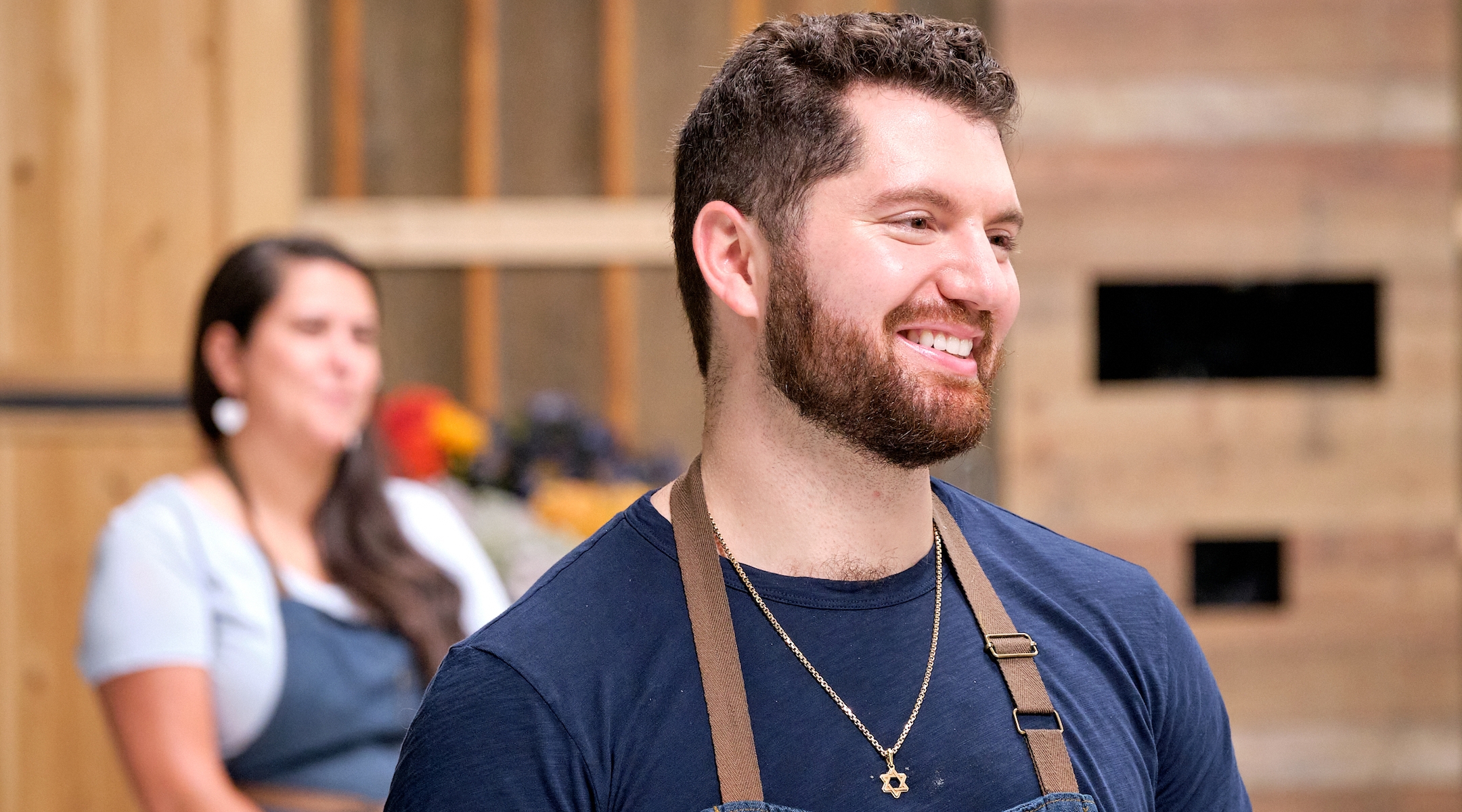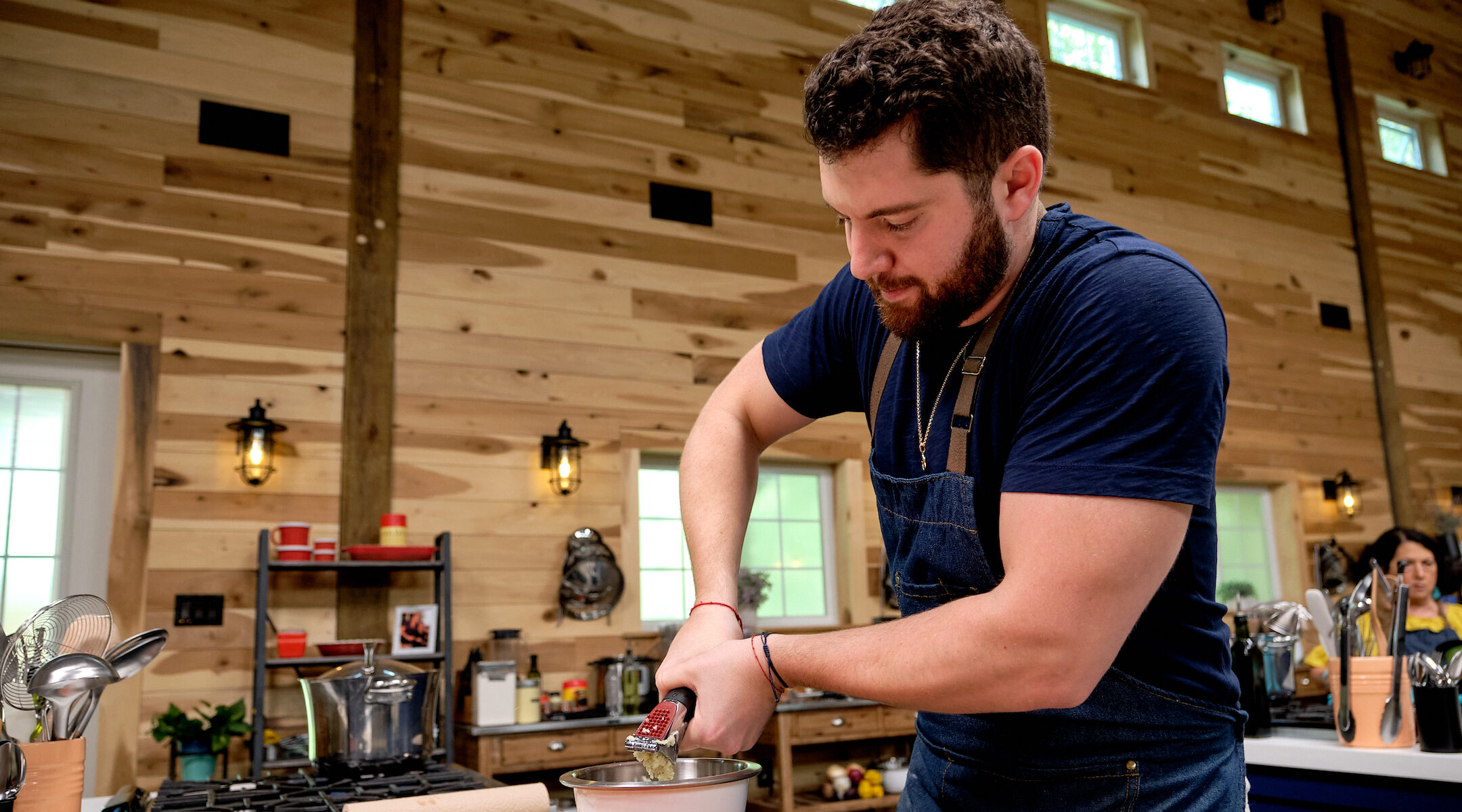(New York Jewish Week) – Upper East Sider Brad Mahlof loves to cook — especially dishes that highlight his family’s Libyan Jewish background.
But cooking is something that Mahlof thought of as a hobby and a way to connect with friends and family — not something he could do professionally, or on a cooking competition show. That all changed when the producers of PBS’s “The Great American Recipe” reached out several times to him via his Instagram, wanting him to join the cast of the series’ second season.
“I actually thought it was a scam,” said Mahlof, whose day job is a residential real estate developer. He added that he created his Instagram account, @cookwithbrad, to share his recipes with loved ones.
Mahlof, 33, was eventually convinced that the offer was legitimate, and he appears as one of two Jewish contestants on the current season of “The Great American Recipe,” which highlights home chefs from different backgrounds and regions of the country. Designed to be uplifting rather than cutthroat, the show’s challenges are designed to showcase favorite recipes inspired by the chef’s heritage and personal life. The winner of the season gets their recipe on the cover of “The Great American Recipe Cookbook.”
“It was kind of a fun evolution from, ‘oh, I’m never gonna ever do something like this’ to all of a sudden, it’s airing,” Mahlof said about the series, which filmed last September. The first episode of the eight-episode season aired on Monday.
“Growing up, my family was a traditional Sephardic Jewish family,” Mahlof says in his first confessional. “But there is basically zero representation of Libyan Jews in the United States, so to have my recipes featured is a great way to show the world how beautiful our culture and food is.”
For the show’s first competition, contestants were asked to cook a dish that exemplifies their backgrounds. Mahlof landed on chraime, a Libyan fish stew, with couscous. For the episode’s second competition — which had contestants cooking a dish that represented their home region — Mahlof, who grew up in a heavily Sephardic and Syrian Jewish area of the Jersey Shore, cooked kosher cod cakes with Israeli salad and amba tartar sauce.
Mahlof’s dishes surprised and impressed judges Tiffany Derry, Leah Cohen and Graham Elliot — and he won both rounds. “I definitely started off strong, so it’s only downhill from here,” Mahlof quipped in a Zoom interview with the New York Jewish Week the morning after the premiere episode aired.
Though he is passionate about Sephardic food, Mahlof told the New York Jewish Week that he began his cooking journey with his mother and aunts. “We didn’t have a lot of measurements — everything’s a little of this, a little of that,” he said. “It was a lot of trial and error and, over the course of many years, I finally kind of feel like I’ve perfected it.”
“I know this is controversial, but I think I actually do a better job than my mom, and she’s an amazing cook,” he added. “I use these recipes that have been in our family for so long as a reference point, and then from there kind of evolved them into my own style.”
Mahlof said that it was his family’s Judaism — specifically, its mix of Ashkenazi, Sephardi and Israeli traditions — that initially got him interested in cooking.
“Just being Jewish honestly makes so many of us home cooks, because we do Shabbat dinner every week,” he said. “Through that, the love of entertaining and family is kind of what fostered my love of cooking. It’s less about the actual love of the process of cooking but I like the end result of everyone coming together and enjoying food.”
Mahlof said that when he was an undergraduate at Brandeis University, he would occasionally skip classes for two or three days at a time to make a giant Shabbat dinner for 50 of his friends. “My favorite dish is mafrum, which is meat-stuffed vegetables that you fry and then you braise them for hours and then pair with homemade couscous, but that takes a full day to cook,” he said. “My house smells like oil and grease for about a month after, so I don’t necessarily make it that often, but if I’m really trying to impress people, that’s usually my go-to.”
It’s these types of dishes that Mahlof is excited to bring to “The Great American Recipe.”
“There’s so many Jews of different ethnicities and origins in the U.S., but being a Libyan Jew is not as common, so it’s always exciting for me to showcase Libyan foods to people because they’re not usually familiar with it,” he told the New York Jewish Week. “Also, there’s no Libyan Jews left in Libya. So it’s important to me to memorialize the heritage of Libyan Jews through our foods and continue to cook it so that those recipes don’t get forgotten.”

Brad Mahlof won both rounds of competition in the season premiere of “The Great American Recipe.” (Courtesy Brad Mahlof)
In addition to highlighting Libyan cuisine, Mahlof said he’s on a mission to prove how accessible kosher cooking can be. Even though the show was filmed in rural Caroline County, Virginia, Mahlof said the crew was able to source everything he needed without a problem.
“My bigger fear was that I do feel like a lot of non-kosher chefs use cheese and butter as a crutch to make everything richer and more delicious,” said Mahlof, who has kept kosher his entire life.
Here in New York, where Mahlof has lived for more than a decade, he continues to make Shabbat meals and host friends for holidays and celebrations.
“New York City has access to such amazing food and ingredients — not only at restaurants but also just our grocery stores and farmer’s markets,” he said. “We’re so lucky to have any type of food we could ever want just right at our doorstep.”
He said in his personal life, his cooking style is “a bit more eclectic” than it is on the show, and he tries to focus on seasonal, fresh produce that he can find in the grocery store or at farmer’s markets. “Even then, my Sephardic upbringing heavily influences my food,” he said. “When I do Italian cooking or Asian cooking, the Middle Eastern spice profile still makes its way into my food.”
Since filming ended, Mahlof has been busy with his real estate job, doing CrossFit and traveling around the world. However, he said that if he could find a way to pay his bills and still be able to live in the city, he would be interested in cooking professionally. And he may be well on his way: Next month, Mahlof will be hosting a pop-up dinner at Sandro’s, an Italian restaurant on the Upper East Side.
“In high school and college, I used to wait tables in the summers and I always saw the people in the kitchen — and they always looked so miserable. I decided I never wanted to work in a kitchen because they were all sweating and stressed,” Mahlof said. “Of course, that’s what I’m doing now. It’s like my worst nightmare but also my dream at the same time.”
As for what happens on this season of “The Great American Recipe,” Mahlof is keeping mum. But he added that although he knows what happens, he’s excited to see how the show gets edited together. “We’re living the reality of it when it’s filming,” he said. “But I know a lot can happen after production, like how they actually piece everything together and what aspects they actually take and put onto the final cut. So I’m curious to see how it all comes together.”
“I was there to represent my culture, Jewish cooking and Libyan heritage —I wasn’t there to serve drama,” he said. “Even though I might have been the villain on the show. We’ll see.”
The New York Jewish Week brings you the stories behind the headlines, keeping you connected to Jewish life in New York. Help sustain the reporting you trust by donating today.





